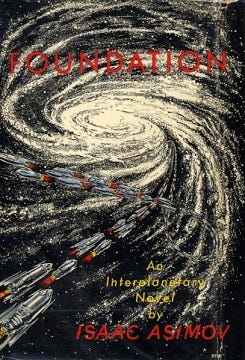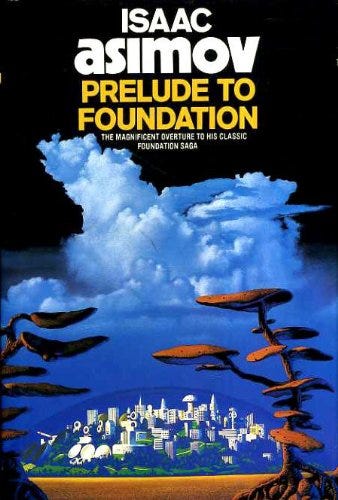I’m currently watching season 1 of Apple TV’s adaptation of Isaac Asimov’s Foundation series. Before I talk about the series, I’d like to tell you about the significance of the original books in my life. In short: the Foundation books have been a shifting but often relevant imaginative playground for me since first I read them in my teens.
The Foundation series is classic ‘golden age’ Science Fiction. The first series of short novels were published between 1942—50. These were later brought out as a trilogy of novels: Foundation, Foundation and Empire and Second Foundation. Then in the 1980s, Asimov published two sequel novels, Foundation’s Edge and Foundation and Earth. Finally, towards the end of his life, Asimov wrote two prequels, Prelude to Foundation and Forward the Foundation! These latter prequels remain my favourites.
The Foundation series is set many thousands of years in the future. Humanity has settled throughout the galaxy in a Galactic Empire that’s over 10,000 years old. The capital of the Empire is Trantor, a city world. (Any resemblance to George Lucas’ totally urbanised Coruscant in the Star Wars movies is less than coincidental). The Empire consists of trillions of people, and is hugely powerful. At the time of Prelude to Foundation, it is ruled by the Emperor, Cleon.
Hari Seldon is the central character of the series. He is a mathematician and a contemporary of Cleon. Seldon is responsible for the development of psychohistory. Psychohistory is a way of predicting the behaviour of a large mass of people. In the first books, Seldon uses psychohistory to predict the imminent collapse of the Galactic Empire:
“…the rotten tree-trunk, until the very moment when the storm-blast breaks it in two, has all the appearance of might it ever had. The storm-blast whistles through the branches of the Empire even now. Listen with the ears of psychohistory, and you will hear the creaking.”
I first read the Foundation books around 1990 or 1991. This was right at the end of the Cold War. My generation had been born into a world that was defined by a conflict between two superpowers, the US and the Soviet Union. For us, this cold conflict seemed eternal, just a fact of life. In fact, it only dated from the end of World War Two, in 1945. From 1989, the Soviet Empire began to collapse. This began with the independence and unification of Germany. The Berlin Wall, which had been built in 1961, over a decade before I was born, came down in 1989. The wall was the first card to fall in the house of the Soviet Empire.

The Foundation books gave a framework of understanding for this momentous collapse. For me, it was a lesson in the transience of history, and the fragility of Empire. I’ve never forgotten this.
A new parallel
Like Seldon, these days I find myself regularly reading civilisation’s tea-leaves. Subjectively, the auguries mostly do not seem good. The Guardian, Wed 15th November 2023: climate-heating gases have reached record highs, and the World Meteorological Organization sees ‘no end in sight to the rising trend’, largely driven by fossil fuel burning. On the 14th November 2023, Kim Heacox in the same newspaper referred to the insanity of the past year being the hottest on record (again) and the fossil fuel industry’s plans to burn yet more fossil fuels. The subtler auguries are also fairly grim. For example, The Guardian also reported on a record increase in water-related violence. Significant because water warfare has long been one feared consequence of an ecologically-strained world.
Every day, Carbon Brief delivers to my inbox a dizzying number of climate-breakdown related events. It’s often difficult to make sense of it all. In fact, I find myself wondering whether humanity might need something like psychohistory. I often get the sense that human massed reactions to events, however complex, are also on some level predictable. This includes what Jared Diamond called ‘rational bad behaviour,’ like fossil fuel companies prioritising profit over ecological survival (Diamond, 2005). Similarly, much of the bad behaviour of our elites seems somehow broadly predictable, as well as the massed human (non) reaction to climate breakdown. It would be good to have a better handle on those patterns.
One emerging field attempts to do exactly that. This field has been named Cliodynamics, after Clio, the Ancient Greek muse of history. Cliodynamics aims to discover the mechanisms underlying processes in history. It intends, finally, to transform history into a science. It was founded by the Russian-American complexity scientist Peter Turchin, who has recently published a book called End Times: Elites, Counter-Elites and the Path of Political Disintegration. You can see by the title that Turchin is also not too optimistic about the future. In 2020, Turchin predicted that the 2020s would be less stable than the 2010s.
Turchin asserts that:
Strong empirical patterns arise because the dynamics of historical societies reflect the action of general social mechanisms. There are laws of history . . . Furthermore, successful case studies of scientific prediction, reviewed in this article, show that we are well on the way to identifying some of these laws. Source: Turchin, 2011.
This field already has its critics. In fact, many are highly skeptical that such prediction is possible at all. These critics point to the poor track record of prophecy, and also significant criticisms from philosophers like Karl Popper. Popper believed that it was impossible to study history in the same way that we study natural processes like planetary objects or atoms (Popper, 1957). This was because each historical situation was unique and unpredictable. I will openly admit that at this point I don’t know who’s right. It’s worth surveying the critiques and also reviews of Turchin’s work like this one and making up your own mind.
Turchin fulfils another traditional role of prophets: the doomsayer. In the Foundation books, Hari earns the nickname ‘Raven’ Seldon because he predicts doom. And there’s an interesting scene in the TV series where the clone-Emperor confronts the succeeding generation of statisticians. The head statistician denounces Seldon as a charlatan fortune-teller. This, too, has resonances with the current moment. Anyone raising the possibility of civilisational collapse risks being denounced as a ‘doomer,’ often by respectable academics.
Foundation
The Apple TV series radically reimagines the Foundation stories. As with most modern telefantasy, the special effects are superb. The visual imagineering is first rate. The makers have also put a great deal of thought into depicting the multiple, diverse cultures of the galactic Empire.
The casting is also highly diverse, and in the first episodes two previously male protagonists have been recast as POC women. There’s also a race-related subtext: the rulers of the old empire are mostly white. This has resonances with colonialism, etc, adding an interesting and contemporary extra dimension to the story. These editorial choices were deliberate, and necessary. Old SF does tend to be the purview of white, heterosexual males, and the limitations of this become more apparent with every passing day.
Another important theme of the TV series is the tension between knowledge and ignorance. One of the main characters, Gaal Dornick, comes from a planet dominated by fundamentalist religion. On this planet, seekers and custodians of scientific and mathematical knowledge are drowned, along with their books. At one point, in a flashback, a young Dornick has an exchange with one ‘heretic,’ Arren Sorn. Sorn tells her that “Furthering knowledge is the most important work of humankind” and that “knowledge gives us ways to survive the destruction till…rebirth arrives.”
Sage words for today. In his book, Why Climate Breakdown Matters, the ecological philosopher Rupert Read laid out three possible futures for global civilisation, given continued large-scale failures of philosophy and practical action. The first possibility is that society will profoundly transform itself in a sustainable direction (Read calls this ‘butterfly’). The second is that our current society will collapse, to be followed by a successor civilisation (dubbed ‘phoenix’). The final possibility is that humans, and possibly the whole biosphere, will become extinct (‘dodo’).
My remaining hope is that somehow, despite all odds, the ‘butterfly’ option prevails. I would like to think that it’s possible to transform our current mode of existence into something that’s far more benign and nurturing for humanity and for the rest of nature. However, so far humanity as a collective has not been responding very well to the ‘polycrisis.’ After an extreme climate year, I think that it’s time to think about worst-case contingencies. This includes considering the possibility that our current civilisation is destroying itself, and that this process is possibly irreversible.
So it’s time to think about Read’s ‘phoenix’ option: a successor civilisation, our own ‘Foundation.’ Read thinks we need to think about “lifeboats,” and ways to avoid these becoming “viciously exclusive” (p. 135). These lifeboats might be analogous to Mediaeval monasteries, preserving knowledge through a dark age. But we do need better plans, or any plans, for worst-case scenarios.
The Foundation series is about just such a plan. In the book series, Seldon used psychohistory to shorten the intervening dark age and plot a successor Empire. I think that it is time to think about how vital knowledge could be preserved in order for successor generations to be able to use. The astrobiologist Lewis Dartnell’s 2015 book The Knowledge: How To Rebuild Our World After An Apocalypse is a good place to start. In his 2006 book Revenge of Gaia, James Lovelock also suggested that we might even need to think about printing a world encyclopedia of vital knowledge on durable paper. Just think about what would happen if vital pieces of hard-won knowledge were lost. Such as the knowledge that much disease is caused by bacteria, and that you need to sterilise surgical instruments and hands before medical procedures.
Because Sorn was right: such knowledge might well help successive generations endure. At this point, this needs to be a priority. Hari Seldon, and Isaac Asimov, would likely agree.
References
Diamond, J. (2005). Collapse: How Societies Choose to Fail or Succeed. Viking Press.
Popper, K. (1957). The Poverty of Historicism. Routledge.
Read, R. (2022). Why Climate Breakdown Matters (Why Philosophy Matters). Bloomsbury Academic.
Rees, William. (2023). The Human Ecology of Overshoot: Why a Major ‘Population Correction’ Is Inevitable. World. 4. 509-527. 10.3390/world4030032.
Turchin, P. (2011). Toward Cliodynamics – an Analytical, Predictive Science of History. Cliodynamics: The Journal of Quantitative History and Cultural Evolution, 2(1). https://doi.org/10.21237/c7clio21210







